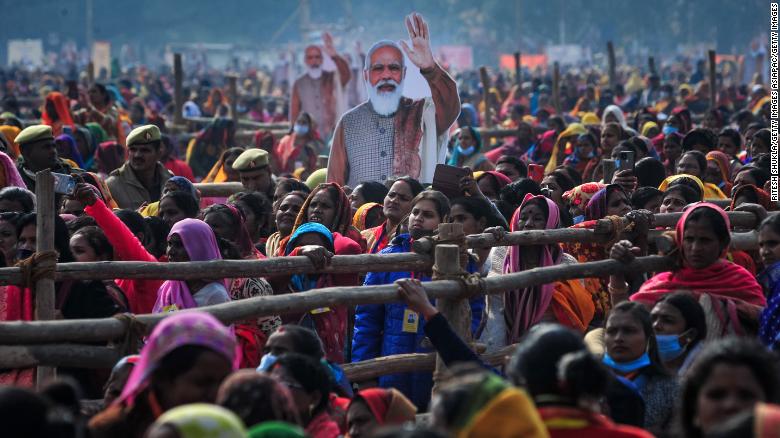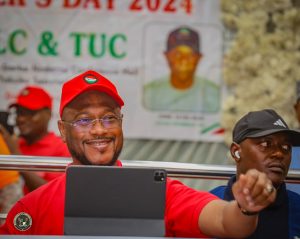As Omicron spreads in India, mass gatherings spark fears of another wave

In the past week, India’s Omicron case numbers have more than tripled, with 781 infections now recorded, compared to 236 last Tuesday.It may not seem that many in a nation of 1.3 billion people, but the variant’s rapid spread in other countries — several of which are now seeing dramatic surges — is enough to make health experts nervous. And the real number of Omicron cases is likely higher than official figures due to insufficient testing.”If India observes the same pattern as the United Kingdom, and if we compare the population of both countries, 80,000 daily cases in the UK would mean around 1.4 million daily Covid cases in India,” said VK Paul, head of the country’s Covid Task Force, at a news conference on December 17.For the past month, India has been steadily reporting 6,000 to 9,000 total Covid cases a day — but several of the country’s biggest cities have seen infections spike in recent weeks.The financial hub Mumbai, which had been reporting 600 to 800 new daily cases in previous weeks, recorded 2,510 cases on Wednesday. New Delhi, the national capital, also saw more than 900 cases Wednesday — a sharp increase from the start of the month, when daily new cases had hovered in the dozens.The federal Health Ministry warned last week of “initial signs of a surge in cases of Covid-19,” with researchers at the Indian Institute of Technology projecting a third wave could peak between late winter and early spring.The situation might sound familiar. In some ways, it echoes the past spring, right before the country was ravaged by a second coronavirus wave from March through June. The surge completely overwhelmed India’s health care system, with no beds, oxygen supplies, or medicine left. Across the country, patients were turned away by overflowing hospitals and left dying on the streets.The second wave was also preceded by a state election that saw large political rallies even as cases rose and doctors’ warnings went unheeded. Now, experts fear India may be on the cusp of a third wave.So far, data from other countries suggests Omicron may cause milder disease than previous variants, especially among fully vaccinated individuals, and several doctors told CNN they expect a lower hospitalization rate with Omicron. But the strain’s higher transmissibility and India’s sheer population size means it could still see a high number of infections, even if it’s less lethal.India has vaccinated some 577 million people — about 42.2% of the population, according to data from Johns Hopkins University.And from early January, India will start vaccinating children ages 15 to 18, as well as distributing booster shots for priority groups such as health care workers and the elderly.In India the risk of the virus spreading rapidly is compounded by the fact that many people have stopped wearing face masks, are getting tested less frequently than before, and are congregating in large numbers.The variant holds a high number of mutations, which makes it hard to predict, said Om Srivastava, an infectious diseases and immunology expert based in Mumbai. Though “there is a potential it will be mild and pass off … all you need is any of these mutations to turn nasty,” he said. “Nobody knows what’s going to be happening if it does turn nasty.”Arvind Kejriwal, chief minister of Delhi, echoed Modi’s reassurances. During the second wave, Delhi was recording up to 27,000 new cases a day — but now, the territory is “prepared to deal with even 100,000 cases per day,” he said last week.But thousands of resident doctors across the country have been on strike since December 17, protesting a delay in allocating hospitals to doctors who have passed their post-graduate exams — leaving them unemployed and unable to support the country’s Covid efforts.”In the view of the impending third wave … if this (postgraduate) counseling is not held, with the limited manpower it will be too difficult to handle the third wave in the country,” said the Indian Medical Association (IMA), one of India’s largest network of doctors, on December 23. The delay has resulted in a “shortage of 45,000 doctors on the frontline,” it added.And the supplies boasted by Modi and Kejriwal are largely focused on response capacity — while experts warn the country needs far more stringent prevention measures to avoid an outbreak in the first place.”Any contributor who creates overcrowding would be a major contributor in (rising cases), said Dhiren Gupta, a senior pediatrician in Delhi, on Friday, adding that political rallies could become “a super spreader event.””There is no doubt we should postpone election rallies for at least two months,” he said. “Prevention is the best cure for India.”



